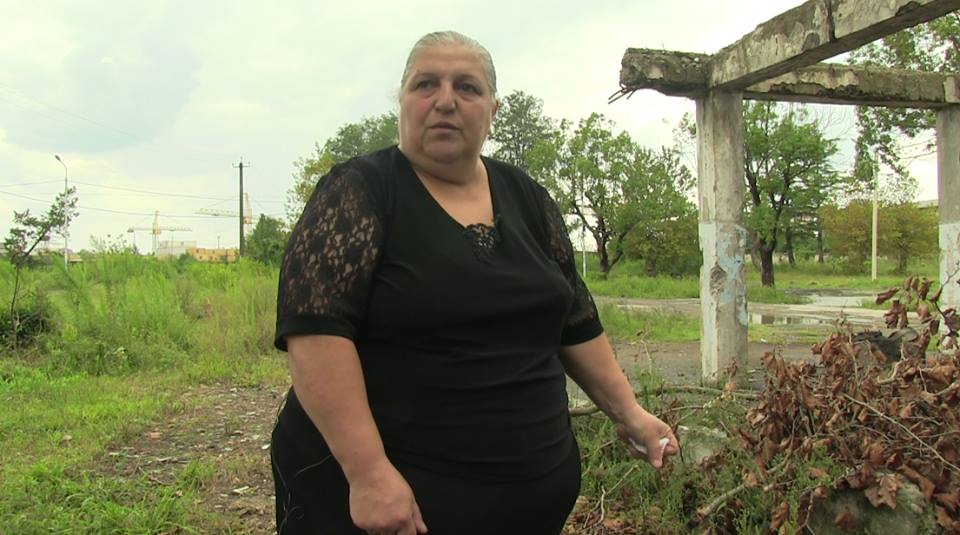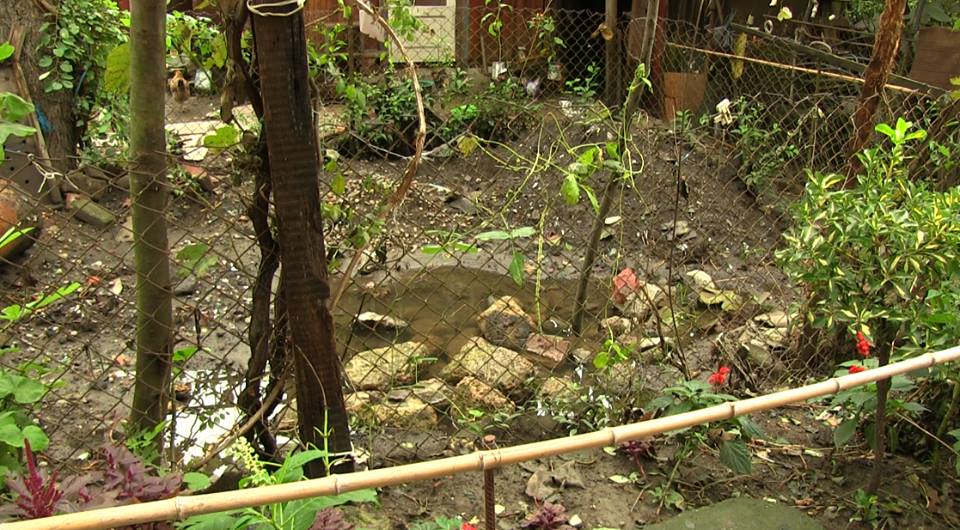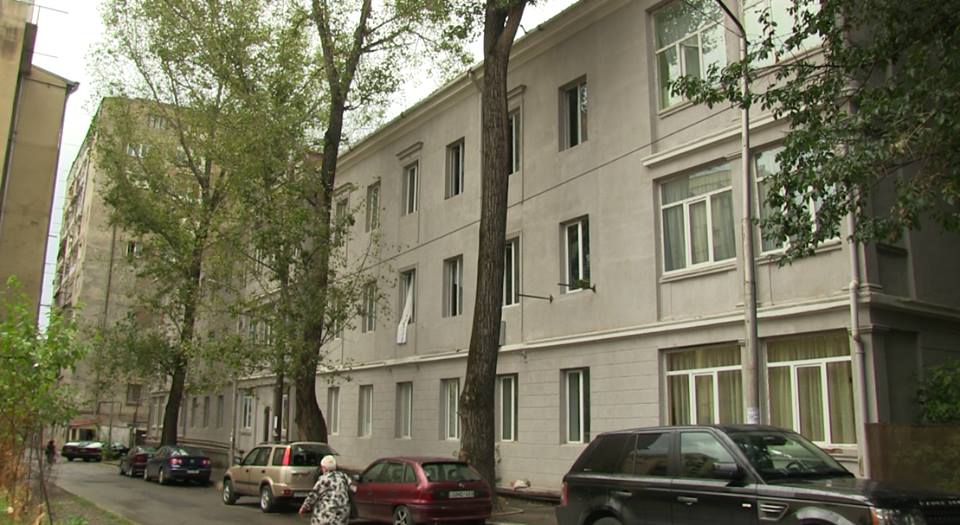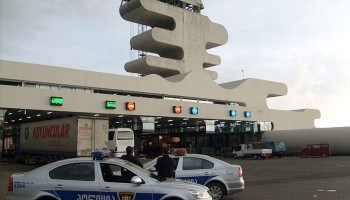Mikia told a reporter for the Organized Crime and Corruption Reporting Project (OCCRP) that for the past 21 years, she has lived as an internally displaced person (IDP) in a decrepit former kindergarten used for refugee housing in the western Georgia city of Poti.
Mikia and her family are part of a growing global army of IDPs, according to the United Nations High Commissioner on Refugees (UNHCR), which says there were 28.8 million IDPs around the world in 2012. That number has steadily increased from around 17 million in 1997.
Georgian Prime Minister Irakli Garibashvili, speaking at the United Nations on Sept. 22, said his country is still dealing with hundreds of thousands of people who lost their homes in the country’s three conflicts since the early 1990s.
According to Georgia’s Ministry for Internally Displaced Persons from the Occupied Territories, Accommodation and Refugees, Georgia has registered 253,392 IDPs, or about five percent of the population. As of March 2014, slightly less than half were still living in collective centers, while 134,068 had moved on into permanent housing.
So Mikia was thrilled in 2011 when her cousin Davari Kvaratskhelia, a fellow Abkhazian refugee, told her that she was in the real estate business in Tbilisi and could help her get a flat. Lamara Mikia’s cousin took $5,000 from her for an apartment she could not provide.
Lamara Mikia’s cousin took $5,000 from her for an apartment she could not provide.
Mikia’s cousin didn’t help her. She took US$ 5,000 from Mikia for a flat she could never deliver, part of a larger scam that eventually landed Kvaratskhelia in prison for five years, even as she claimed that she handed all the money she collected from refugees to officials in the ministry that is supposed to help refugees.
At least one of those ministry officials was busy organizing a reconstruction kickback scheme that landed him, too, in prison. All of this over 7 Tashkent Circle--a building neither the ministry nor Kvaratskhelia had any right to renovate, for refugees or anybody else.
At first, Mikia thought her cousin was a savior. “She told me she was involved in the trading of flats,” Mikia said. “She told me she worked at the Ministry of Refugees as a building coordinator. I believed her.
“She asked me why I hadn’t already moved to Tbilisi,” Mikia said. “I told her I couldn’t afford a flat. She told me that the ministry had more flats for refugees than they needed. She said they would be fixing up some more flats soon and then refugees could own them.
“She said that 45 families now lived in an old Police Academy building in Tbilisi, and that she had helped every one of them get their flat. She mentioned mutual acquaintances living there. We talked for hours.”
A few months later, Kvaratskhelia called Mikia in Poti and said she had been told to find 24 families to resettle at 7 Tashkent Circle. She said Mikia only needed US$ 5,000 to secure a place.
“She said it was a good project being implemented by the ministry. I didn’t think my cousin would make up such a story,” Mikia recalled.
Mikia travelled to Tbilisi where she met with Kvaratskhelia, who was joined by a mutual acquaintance from Ochamchire, Violeta Akijbaia. Akijbaia told Makia how one of her relatives returned to Georgia after 20 years as a refugee and had only to mention Kvaratskhelia’s name to solve all their problems.
The next day, Kvaratskhelia took her cousin to see the building. “It hadn’t been repaired yet, but I liked the place a lot,” Mikia said. “Everything she said seemed to be true.” Sewage mixes with drinking water in the garden behind Mikia’s flat in Poti.
Sewage mixes with drinking water in the garden behind Mikia’s flat in Poti.
Mikia’s sister-in-law, also a refugee, joined the deal and both women paid Kvaratskhelia US$ 5,000 for two flats through a bank transfer. “We didn’t have any written transaction; we only had a verbal agreement. Then five other people from Poti met Davari. She showed them the flats and they gave her US$ 5,000 each.”
Several months passed. “The repairs on the building began,” Mikia said. “We thought we would occupy the flats soon. Every time we called Davari, she said we would own them soon.”
Yet after one year, the flats still weren’t available. “Davari gave different reasons,” Mikia said. “She said the president wasn’t in Georgia, and that he was supposed to be at the building dedication. Or that the (refugee) minister Koba Subeliani was very busy.”
Mikia still believed her cousin.
“She took me into the ministry several times,” Mikia said. “She walked around inside the building without anyone ever stopping her. I didn’t go into the offices when she was meeting people, but one time I saw her talking with Alexander Gakharia, head of the internal control department.”
The situation began to change after the 2012 election, when the ruling United National Movement party was replaced by the Georgian Dream coalition. A number of officials quickly lost their jobs.
“When the minister (Subeliani) was dismissed in 2012, Davari was very anxious,” Mikia recalls. “But she told us that all the people in the ministry that were involved in our deal still had their jobs.
“Then one day she called us and told us to come quickly from Poti to Tbilisi (a distance of 325 km). We hired a taxi and got there at 4 pm. Davari was there, but we could see the building was already occupied.” Refugees began illegally moving into this Tbilisi building before renovations were finished.
Refugees began illegally moving into this Tbilisi building before renovations were finished.
The flats at 7 Tashkent Circle had filled up with 35 other refugee families who moved in illegally before the repair work was finished. Neither ministry officials nor the police have forced them to leave. The current residents refused to speak on the record about how they learned about the flats, and they refused to let reporters enter their flats.
Mikia wasn’t the only person to pay for a flat but be left with nothing. When her cousin was arrested, she was charged with defrauding 30 people out of more than $US 250,000.
How was this possible?
As it turns out, her cousin didn’t work for the ministry. The refugee ministry didn’t even own 7 Tashkent Circle. The building was owned by the Ministry of Economics, which had no plans to repair the building for occupancy by anyone.
According to a letter issued by the economic ministry’s Agency for the Management of State Property, there had never been a plan to transfer flats to refugees so they could move in.
But somebody at the refugee ministry had their own plan. In 2011, the ministry published a notice for a tender for about US$ 369,000 to repair 7 Tashkent Circle for refugees. If anybody at the Ministry of Economics noticed this tender, they did nothing to look into it.
Five companies applied, and LTD Monolitmsheni won the tender with the lowest bid of US$ 247,000. Nugzar Davalianidze, the chief of the ministry’s Department of Technical Supervision, signed documents that stated the project was finished on time and at a cost of about US$ 247,000. In reality, the project was late, and cost only US$ 224,000.
The ministry transferred the entire US$ 247,000 to Monolitmsheni. The theft was discovered during a prosecutor’s office investigation into refugee housing tenders. Davalianidze was convicted and given a three-year prison sentence. Monolitmsheni executive Gela Gochitidze was eventually convicted for several similar refugee housing scams and was sentenced to 16 years in prison and fined US$ 28,900.
Khvaratskhelia was tried on May 21 at Tbilisi City Court. She admitted lying about being a refugee ministry employee, fraudulently promising flats at 7 Tashkent Circle, and extorting US$ 250,000 from 30 victims. She was sentenced to five years in prison.
If Khvaratskhelia had criminal partners inside the ministry, she kept her mouth shut during her trial. But before the trial, Lora Akishbaia, another victim who lost US$ 11,000, visited Khvaratskhelia and made a secret audio recording. Khvaratskhelia claimed that she gave all the money she collected to various ministry employees, some of whom she named.
Mikia and Akishbaia took this tape to a 2013 meeting with Lili Mamasakhlisi, the prosecutor assigned to the case. In April of 2014, Mikia and Akishbaia received documents from the prosecutor’s office acknowledging that they were victims.
But when Khvaratskhelia’s case went to court a month later, nobody notified the victims or their lawyer. As for the tape, the court acknowledged its existence and suggested that it be tested by an expert who could verify its legitimacy. But it wasn’t played in court and the names were never released.
To date, Khvaratskhelia has taken the blame for the whole scam and there has been no investigation into other members of the ministry named in the tape who might have been involved. And while the government now admits the people have been defrauded, there seem to be pledges but little effort to fix their problem.
Khvaratskhelia has begun serving her prison sentence. In August, Mikia and Akishbaia were able to arrange a meeting with Sozar Subari, the current minister for refugees. He assigned deputy minister Shota Rekhviashvili to look into the case. After a second meeting in September, Mikia says Subari told her the families now living in 7 Tashkent Circle would receive notices of eviction. Technically, it’s not Subari’s decision. The building belongs to the Ministry of Economics.
While the current residents admit privately that they moved in illegally, they say they should be allowed to stay.
“My family consists of five members: my wife, son, daughter-in-law and her mother. I have been waiting for a flat from the government for 20 years,” said Valeri Shakaia, also an Abkhazian refugee. “We found this empty building which was being repaired for refugees. People like us were tired of waiting, so we moved in here.”
Shakaia is a disabled war veteran from Abkhazia. “Nobody will dare to take this building from us,” he said. “The government didn’t give us anything for 20 years. The people living here aren’t going to leave. They can’t force us.
“I will be at war with them.”
Mikia has returned to the makeshift home in the former Poti kindergarten when she has lived for 21 years. Meanwhile, 35 families at 7 Tashkent Circle have a roof over their heads. But they have no security, knowing they could be evicted at any time.






